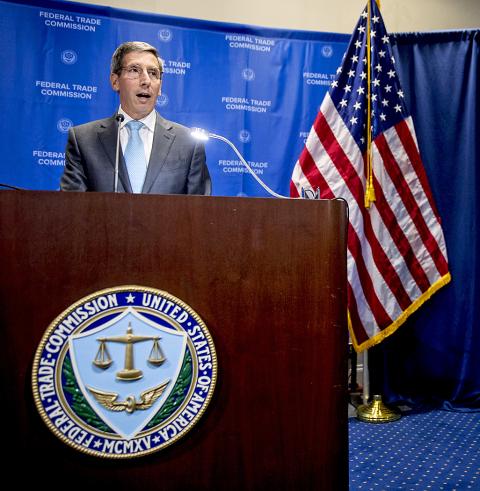Google on Wednesday agreed to pay US$170 million to settle charges that it illegally tracked and targeted children on its YouTube video service, a deal that critics said was too soft on the Internet giant.
The settlement with the US Federal Trade Commission (FTC) and the New York State attorney general is the largest amount in a case involving the US Children’s Online Privacy Protection Act, a 1998 federal law, officials said.
YouTube breached regulations that require child-directed Web sites and online services to obtain parental consent prior to collecting personal information from children under 13 that might be used for advertising, officials said.

Photo: AP
The agreement settles Google’s liability over videos directed at kids even if produced by others for the video-sharing platform.
Critics of the Internet giant said that YouTube marketed itself as a destination for children and benefited by selling advertising to toymakers and others.
Commission chairman Joe Simons said that the settlement “prevents YouTube and Google from turning a blind eye to the existence of kids-directed content” on its platform.
The settlement makes Google liable for breaches by third-party content creators, going beyond federal law that requires the platform to have knowledge that videos are directed at children, Simons said.
“No other company in America is subject to these requirements,” he said.
New York Attorney General Letitia James said that the deal calls for “major reforms” to YouTube’s business practices in addition to the fines.
“Google and YouTube knowingly and illegally monitored, tracked and served targeted ads to young children just to keep advertising dollars rolling in,” James said.
YouTube outlined how it would change the way it handles children’s content under the agreement.
“We will treat data from anyone watching children’s content on YouTube as coming from a child, regardless of the age of the user,” YouTube chief executive officer Susan Wojcicki said in a statement. “This means that we will limit data collection and use on videos made for kids only to what is needed to support the operation of the service. We will also stop serving personalized ads on this content entirely, and some features will no longer be available on this type of content, like comments and notifications.”
Google would create a US$100 million fund “dedicated to the creation of thoughtful, original children’s content on YouTube and YouTube Kids globally,” Wojcicki said.
The settlement, which must be approved by a federal court, calls for the commission to receive US$136 million and New York State the remaining US$34 million. The deal was approved by a 3-2 vote.
Activists who last year filed a complaint against YouTube said the deal falls short.
“We are gratified that the FTC has finally forced Google to confront its longstanding lie that it wasn’t targeting children on YouTube,” said Jeff Chester of the Center for Digital Democracy, one of the groups in the complaint.
However, the “paltry financial penalty of [US]$170 million” is a mere slap and “sends a signal that if you are a politically powerful corporation, you do not have to fear any serious financial consequences when you break the law,” Chester said.

SETBACK: Apple’s India iPhone push has been disrupted after Foxconn recalled hundreds of Chinese engineers, amid Beijing’s attempts to curb tech transfers Apple Inc assembly partner Hon Hai Precision Industry Co (鴻海精密), also known internationally as Foxconn Technology Group (富士康科技集團), has recalled about 300 Chinese engineers from a factory in India, the latest setback for the iPhone maker’s push to rapidly expand in the country. The extraction of Chinese workers from the factory of Yuzhan Technology (India) Private Ltd, a Hon Hai component unit, in southern Tamil Nadu state, is the second such move in a few months. The company has started flying in Taiwanese engineers to replace staff leaving, people familiar with the matter said, asking not to be named, as the

The prices of gasoline and diesel at domestic fuel stations are to rise NT$0.1 and NT$0.4 per liter this week respectively, after international crude oil prices rose last week, CPC Corp, Taiwan (台灣中油) and Formosa Petrochemical Corp (台塑石化) announced yesterday. Effective today, gasoline prices at CPC and Formosa stations are to rise to NT$27.3, NT$28.8 and NT$30.8 per liter for 92, 95 and 98-octane unleaded gasoline respectively, the companies said in separate statements. The price of premium diesel is to rise to NT$26.2 per liter at CPC stations and NT$26 at Formosa pumps, they said. The announcements came after international crude oil prices

A German company is putting used electric vehicle batteries to new use by stacking them into fridge-size units that homes and businesses can use to store their excess solar and wind energy. This week, the company Voltfang — which means “catching volts” — opened its first industrial site in Aachen, Germany, near the Belgian and Dutch borders. With about 100 staff, Voltfang says it is the biggest facility of its kind in Europe in the budding sector of refurbishing lithium-ion batteries. Its CEO David Oudsandji hopes it would help Europe’s biggest economy ween itself off fossil fuels and increasingly rely on climate-friendly renewables. While

SinoPac Financial Holdings Co (永豐金控) is weighing whether to add a life insurance business to its portfolio, but would tread cautiously after completing three acquisitions in quick succession, president Stanley Chu (朱士廷) said yesterday. “We are carefully considering whether life insurance should play a role in SinoPac’s business map,” Chu told reporters ahead of an earnings conference. “Our priority is to ensure the success of the deals we have already made, even though we are tracking some possible targets.” Local media have reported that Mercuries Life Insurance Co (三商美邦人壽), which is seeking buyers amid financial strains, has invited three financial